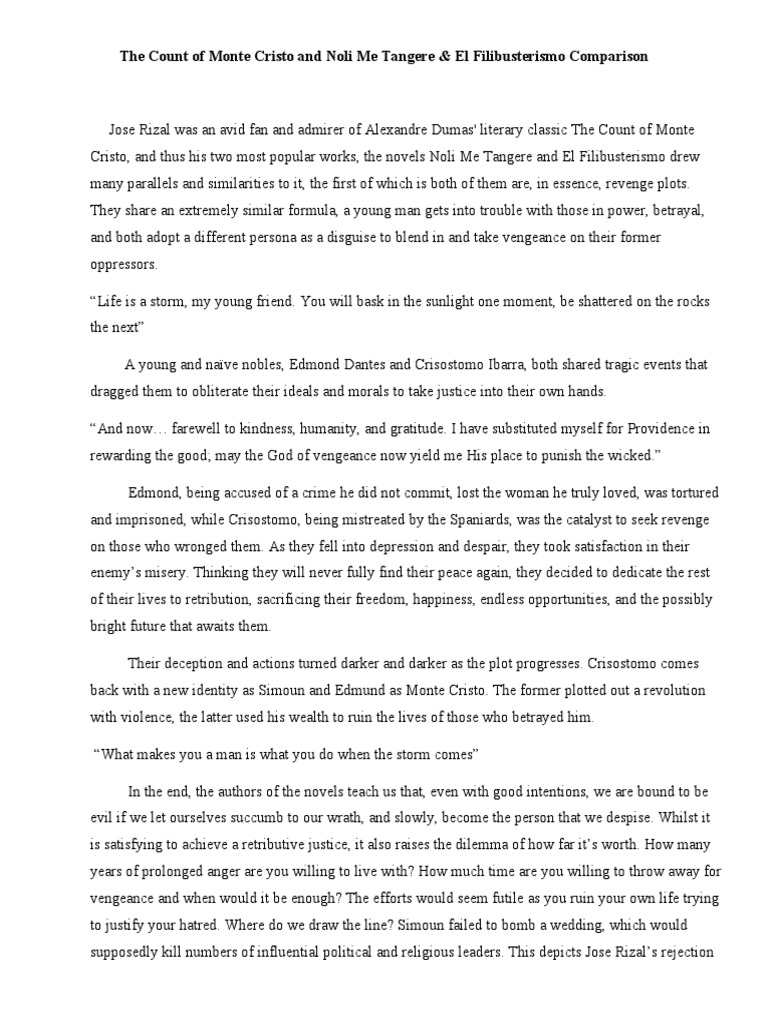Exploring The Themes Of Revenge And Justice In The Count Of Monte Cristo

Table of Contents
Edmond Dantès's Path to Revenge
Edmond Dantès's journey is a potent example of how injustice can fuel a desire for revenge. His story serves as a cautionary tale, illustrating the devastating consequences of betrayal and the transformative power of suffering.
The Unjust Imprisonment
Edmond's initial downfall stems from a web of deceit spun by those he considered friends. This cruel betrayal and subsequent wrongful imprisonment form the bedrock of his thirst for vengeance.
- Fernand Mondego's jealousy: Fueled by his unrequited love for Mercédès, Fernand falsely accuses Edmond of treason, setting in motion a chain of events leading to his imprisonment.
- Danglars's greed: Danglars, driven by avarice and a desire for power, conspires with Fernand to ensure Edmond's ruin.
- Villefort's ambition: Villefort, fearing exposure of a past indiscretion, actively participates in the conspiracy, ensuring Edmond's imprisonment on trumped-up charges.
This profound injustice, coupled with the harsh conditions of his confinement, irrevocably shapes Edmond's psyche, transforming him from a naive young man into a calculating mastermind driven by a relentless desire for revenge. The years of suffering and the injustice he endured become the fuel for his meticulously crafted plan of retribution.
The Acquisition of Power and Knowledge
Imprisoned in the Château d'If, Edmond undergoes a remarkable transformation. His time in confinement isn't merely one of suffering; it's also a period of intense learning and growth.
- Learning from Abbé Faria: The Abbé, a fellow prisoner, becomes Edmond's mentor, imparting invaluable knowledge of history, languages, and various skills.
- Acquiring wealth and influence: Through the Abbé's guidance, Edmond discovers the location of a hidden treasure, providing him with the financial resources to enact his revenge.
- Mastering disguise and deception: Edmond hones his skills in disguise and deception, allowing him to manipulate those who wronged him and orchestrate their downfall.
This acquisition of power and knowledge is not simply a means to an end; it’s a reflection of Edmond's personal evolution. He uses his newfound skills not only for revenge but also to subtly control and manipulate the lives of those involved in his original downfall. This control itself becomes a form of power, adding another layer to the complexity of his actions.
The Nature of Justice in the Novel
The Count of Monte Cristo presents a nuanced perspective on justice, questioning the very definition of retribution and its ethical implications.
The Questionable Morality of Revenge
While Edmond's pursuit of revenge might initially appear justified given the injustice he suffered, a closer examination reveals the questionable morality of his actions.
- The suffering of innocent parties: In his quest for revenge, Edmond often causes collateral damage, inflicting suffering on individuals who were not directly involved in his original downfall.
- The destructive nature of vengeance: The novel demonstrates the self-destructive nature of revenge, showcasing how Edmond's relentless pursuit consumes him, leaving him ultimately unfulfilled.
- The blurring lines between right and wrong: Dumas masterfully blurs the lines between justice and vengeance, forcing the reader to question whether Edmond's actions can be considered just retribution or merely a form of self-destructive behavior.
The novel forces us to confront the complexities of morality and the limitations of seeking justice through revenge.
The Role of Fate and Circumstance
Fate and chance play a significant role in shaping the narrative's unfolding events, highlighting the unpredictable nature of life and its impact on both Edmond's suffering and his eventual triumph.
- The coincidences that allow Edmond to escape: A series of seemingly random events facilitates Edmond's escape from prison.
- The unexpected encounters that fuel his revenge: Chance encounters provide Edmond with the opportunities he needs to execute his carefully crafted plans.
- The ironic twists of fate: The novel is rich with ironic twists of fate, emphasizing the unpredictable and often chaotic nature of justice and retribution.
These elements contribute significantly to the novel's complexity, reminding us that justice is not always straightforward or easily attainable. The role of fate serves as a reminder that even the most meticulously planned revenge can be subject to the whims of chance.
Comparing Revenge and Justice
The novel serves as a powerful commentary on the failings of formal justice and the subjective nature of justice itself.
Differentiation between Revenge and Justice
Edmond's actions starkly contrast with a more traditional understanding of justice.
- The legal system's failures: The novel exposes the failures of the legal system, highlighting its inability to provide true justice in Edmond's case.
- The limitations of formal justice: The limitations of the formal legal system underscore the need for a more nuanced understanding of justice.
- The subjective nature of justice: The novel questions the very definition of justice, highlighting its subjective nature and emphasizing the diverse perspectives on what constitutes fair retribution.
This comparison underscores the difference between personal vengeance and societal justice, prompting the reader to consider the ethical implications of both.
The Lasting Legacy of the Narrative
The Count of Monte Cristo remains incredibly popular, continuously explored in literature and various adaptations, demonstrating the enduring power of its themes.
- The exploration of themes in modern media: The novel's themes continue to resonate with modern audiences, reflected in numerous film, television, and literary adaptations.
- The relatability of the themes: The themes of betrayal, injustice, and the desire for revenge remain powerfully relatable, transcending time and cultural boundaries.
- The enduring power of revenge narratives: The enduring popularity of The Count of Monte Cristo highlights the enduring power of revenge narratives in literature and popular culture.
The novel's continued relevance underscores the timeless appeal of its exploration of revenge and justice, prompting ongoing discussions about morality, ethics, and the complexities of human nature.
Conclusion
The Count of Monte Cristo masterfully explores the intricate relationship between revenge and justice, showcasing the devastating consequences of betrayal and the complexities of retribution. Edmond Dantès's journey serves as a cautionary tale, highlighting the moral ambiguities of seeking justice through vengeance, the destructive nature of relentless pursuit, and the unpredictable role of fate. The novel's enduring popularity speaks to the timelessness of its themes, provoking ongoing conversations about the nature of justice, the limits of the legal system, and the enduring human desire for retribution.
To further engage with these powerful themes of revenge and justice in The Count of Monte Cristo, we encourage you to read the novel, explore its numerous adaptations, and discuss the complexities of the narrative with others. Further research into Dumas's work and other narratives exploring similar themes will enrich your understanding of this enduring masterpiece and its exploration of revenge and justice. The lasting impact of The Count of Monte Cristo lies in its ability to challenge our perceptions of justice, prompting reflection on the intricate relationship between vengeance and morality.

Featured Posts
-
 Kanye West Uses Bianca Censori Image To Promote New Film
May 04, 2025
Kanye West Uses Bianca Censori Image To Promote New Film
May 04, 2025 -
 Us Stanley Cup Playoffs Viewership Down Despite Increased International Appeal
May 04, 2025
Us Stanley Cup Playoffs Viewership Down Despite Increased International Appeal
May 04, 2025 -
 How Middle Managers Drive Performance And Improve Employee Engagement
May 04, 2025
How Middle Managers Drive Performance And Improve Employee Engagement
May 04, 2025 -
 Nigel Farage And Rupert Lowes Explosive Text Message Exchange
May 04, 2025
Nigel Farage And Rupert Lowes Explosive Text Message Exchange
May 04, 2025 -
 Des Moines Ufc Fight Card Start Time Tonight
May 04, 2025
Des Moines Ufc Fight Card Start Time Tonight
May 04, 2025
